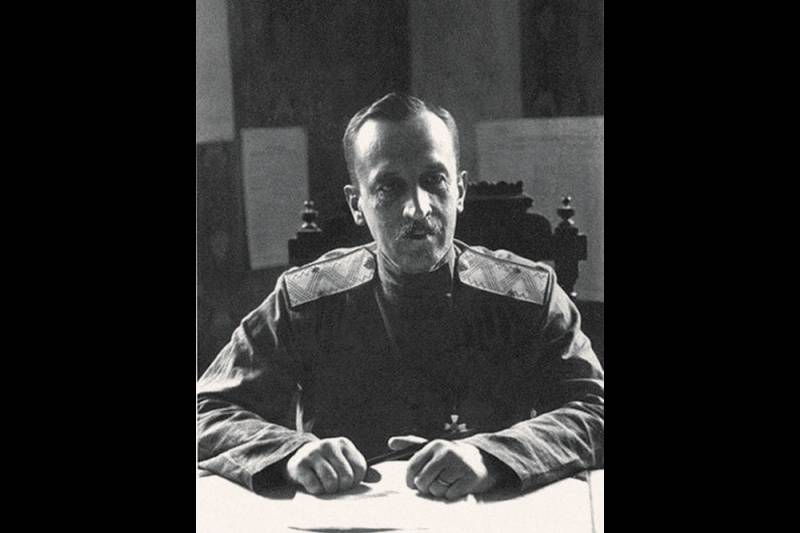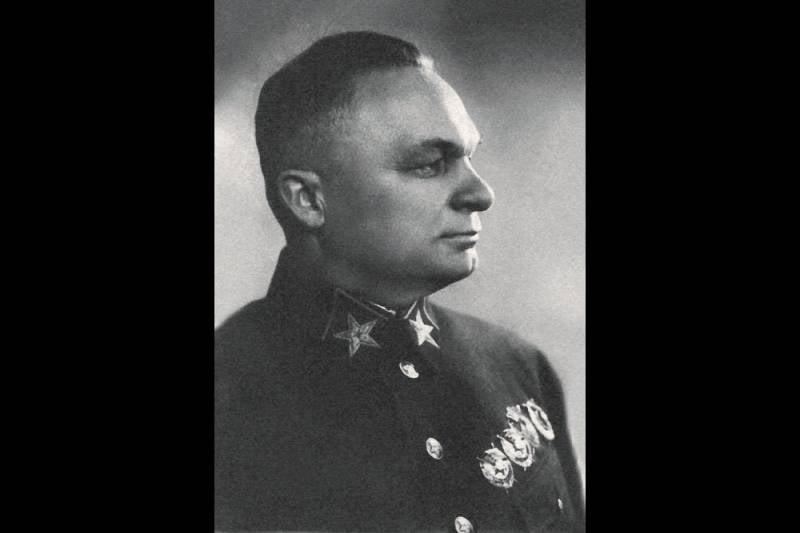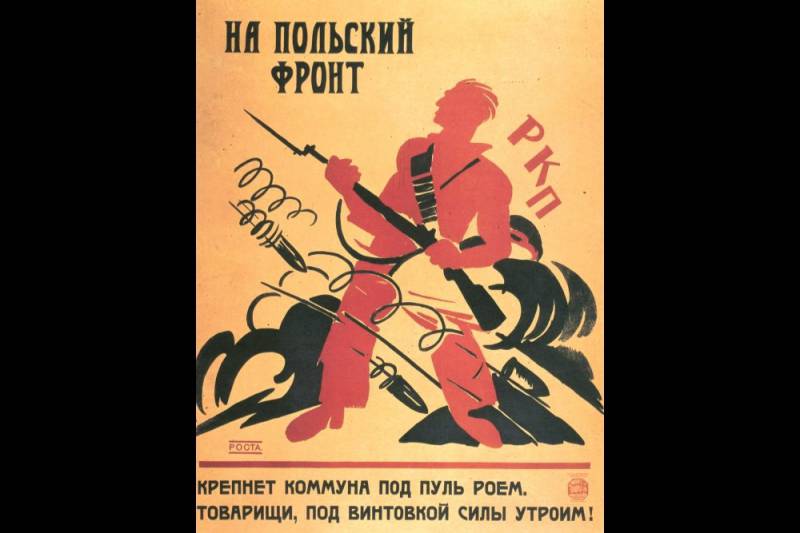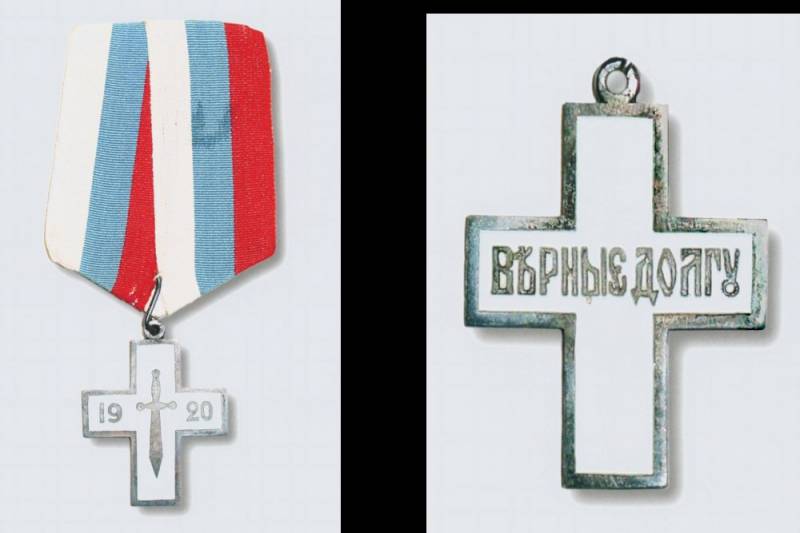The campaign of General Bredova
Major General N.E. Brad
In mid-December 1919, the situation of the whites in the South was complicated: their command came to the idea of the impossibility of keeping the Odessa region, despite the support of the British and French. To the demand of the Allies not to leave their positions, the Commander of the Armed Forces of the South of Russia (VSYUR), Lieutenant-General Anton Ivanovich Denikin, responded with a counter-request - "in case of failure" "to ensure the evacuation of Odessa by the Union fleet and allied transport ", as well as" the passage to Romania of troops, rolling stock and technical equipment. "About 5000 refugees were planned to be transferred with the assistance of the British mission to the Greek islands, the other part, through Romania and the port of Varna, to Serbia and Bulgaria. Departure to the territory Poland was not considered, but in Odessa there were a significant number of natives of Poland and the Western Territory who were planned to be sent to historical homeland through Bessarabia, Podolia and Galicia - "through Bender to Khotyn and further - to the territory occupied by the Poles."
11 January 1920, the troops of the Southwestern Red Front, commanded by Alexander Ilyich Egorov, launched the Odessa operation. The troops of the Novorossiysk region of the All-Union Soviet Union of Civil Defense retreated, and 23-s made it clear that "the capture of Odessa by the Bolsheviks was a matter of a few days." Under these conditions, Lieutenant-General Nikolai Emilyevich Bredov, commander of the Kiev region, was ordered to take command and control "in all respects by all troops, institutions and directorates located in the Odessa district." The only possible way for them then was to take care of the Dniester, to Romania; This option was supported by the British military mission. In Transdniestrian Tiraspol, a detachment of German colonists, the Saving the Homeland detachment, part of the Odessa and its suburbs garrison, detachments of border and police guards and up to 3000 refugees joined the Bredov detachment. The problem was the expanding epidemic of typhoid - by the end of January, the detachment numbered 2000 cases. However, the Romanian government not only did not open the border even for the wounded and sick, but also ordered its border guards to cut ice along the Dniester bank, and to fire artillery fire on the Russians who were crossing the river.
Marshal of the Soviet Union A.I. Yegorov. 1935
Then, on the night of January 30, General Bredov gave the order to move along the Dniester to the north - in order to break into the Polish occupied Podolia or Galicia. An unprecedented 400 milestone winter transition began under the constant pressure of Red Army units. “About the Poles,” later wrote the chief of staff of the detachment, Lieutenant General Boris Alexandrovich Steifon, “we had scant information. We knew that they also fought with the Bolsheviks, but did not even know where their front was and whether they were fighting now? .. "
The search for forms of cooperation with Poland on the part of the VSYUR command began in the middle of 1919, when the military representative of Denikin was sent to Warsaw, and the Polish military and economic missions arrived at the VSYUR headquarters. However, a cooperation agreement was not signed - the Poles demanded that Poland recognize the borders of 1772 and the conviction of the head of the Polish state, Józef Pilsudski, that Kolchak and Denikin were “reactionaries and imperialists.” Everything on the territory controlled by the Poles with the Bredow detachment was a stumbling block. 30 arrived thousands of people, including 20 thousands of bayonets. Among them were almost 4000 patients (of which 2000 - typhus) and 500 injured. With the squadron arrived the families of officers (330 women and children) and about 350 refugees. In some parts of the detachment began hunger.
February 12 white scouts reported that they were in communication with the Polish troops, whose headquarters were located in the Podolsk Novaya Ushitsa. General F. Krajewski demanded from Bredov to move to the neutral zone, but 17 February in Solodkovtsy, in the presence of personal adjutant Marshal Pilsudskiy captain Mr Stanislav Radzivill and a representative of the Cossacks, who were very much in the detachment, began discussing the conditions for receiving the Bredowians by the Poles. It was decided to temporarily place typhous typhus in the villages, the number of medical personnel increased, the detachment was quickly released the necessary medicines. The horses, which in the detachment numbered up to 10 thousands of heads, the Polish command offered to purchase 3000 marks for the head; bredovtsam had to agree.
The discussion of the status of the squad personnel ("Separate Russian army, part of General Denikin's army") lasted for several days and ended on March 5 (the document is dated backdating: March 1) by signing an agreement between the delegates of the General Command of the Polish Army authorized by a letter of the Supreme Command of the Army Polish No. 9142 by captain Prince Stanislav Radziwill, Dr. Major Stanislav Ruppert, Lieutenant Tadeusz Kobylyansky and Lieutenant Joseph Moshinsky, on the one hand, and the gene al-Lieutenant Nikolai delusional ... his chief of staff, Colonel General Staff of Boris Boris Shteifon, a representative of Colonel Cossack troops Belogortseva, on the other hand. " Under this agreement, Bredov’s army was allowed into the territory occupied by Polish troops, and the Polish command pledged to do “everything possible to return all soldiers and officers ... of the families that were with them to the territory occupied by General Denikin’s army” and to act as an intermediary between the Delusional and the governments allied states. Officers were allowed to keep personal firearms. weapon (at the time of going to the camps, it, as well as horses, carts and military property were taken for preservation by the High Command of Poland). Cold weapons Cossacks were allowed to carry in echelons, in separate tsehhauz. It was agreed that if the issue of sending Bredov’s army to Denikin’s troops was delayed longer than the quarantine time, the personnel would be stationed at the points indicated by the High Command of the Polish Army, and would have to follow the instructions of this command, maintaining military discipline. Armaments, wagons, communications, ammunition, medical equipment, etc. were handed over to the Polish Ministry of War - at the disposal of a specially created commission of the chief cavalry inspector of the Polish army, Colonel Kavetsky, to transfer the Poles to the Podolsk front.
The attitude of the Poles to the presence of Russian units on their territory was, however, different. The Minister of War, Lieutenant-General Jozef Lesnevsky, in a letter to the Minister of Foreign Affairs, suggested that the British government should be required to maintain funds and transport abroad the "shortages of Denikin's army" infected with typhoid. In order to avoid an epidemic, he insisted on a significant increase in sanitary personnel and medical supplies and requested to immediately contact the British government regarding the financial support of this “Anglo-Denikin event”.
In the end, all parts of Bredov were interned in Poland, in the camps of Pikulitsa, Dembe (Dombé, Dembia), Strzhalkovo and Aleksandrov-Kujawski. Initially, the first three were set aside for them, moreover, the Bolsheviks and Ukrainians were taken out for Dembe and Pikulits for this purpose, and left in Strzhalkovo the Reds, giving them a special section behind the wire. The Polish camp commanders applied the regime for prisoners of war to the Bredowans, which made Bredow go on a visit to the Deputy Minister of War General Kazimierz Sosnkovsky. Sosnkovsky made a very favorable impression on the Russian delegation: "I became aware of all the cases" of the Bredov detachment, "quickly grasped the essence of each question, proved to be alien to formalities and a man of wide scope." He signed the instruction, according to which the bredovtsy should not have been in the position of prisoners of war and should have been separated from the Bolsheviks and Ukrainians, “sharing life with them is unacceptable by the difference of ideologies”. Russian units had the right to preserve their internal order, “prepare food from the products received from the camp commandants by their own care and arrange baths.
However, this instruction did not work. “The contentment issues were constantly complicated,” recalled Steifon, “the Polish camp commanders“ rebelled against the drill, ”“ the weapon ... was selected roughly, with violence, ”“ the soldiers were soon separated from the officers, ”“ several times it almost went to armed clashes. " Colonel Kevnarsky (a former Russian officer) summoned universal hatred in Strzhalkovo. By order of his command, in March, revolvers, edged weapons, "topographic maps and compass" were taken from the Bredovites and searched.
On March 31, in the camps, an order was issued by the Commander-in-Chief of the All-Soviet Union of People’s Defense, Lieutenant-General Baron Pyotr Nikolayevich Wrangel, about creating honor officers for the units and institutions of the courts, "whose behavior does not correspond to officer dignity." The order was relevant: some bredovtsy flaunted "in the most fantastic costumes, completely without impressing the officer or soldier." Note that in the Pikulitsa camp the Russian command set more stringent requirements for discipline than in Strzhalkovo. In order to "keep the good name of the volunteer," Major General P. P. Nepenin, in agreement with the Polish camp commander, established control over all "passing through the gate from the camp to the city and village."
In the second half of April, at the level of Sosnkowski, the issue of violation of the Xredmino detachment of the Bredova detachment in March was considered: about "violation of military discipline both inside and outside the camps," about organizing political rallies in Krakow, about conducting anti-Polish and anti-state campaigning and weapon abuse against Polish soldiers in Stryi, Dembe and Strzhalkovo. By order of Sosnkowski, the internees were transferred to the jurisdiction of the Polish Ministry of War, which was now in charge of vacations and issuing permits to leave the camp. It was forbidden to camp outside the camps; personal weapons were to be deposited in special warehouses under the responsibility of the camp administration. All financial transactions - currency exchange, transfer of funds - could be made only with the permission of the camp commander. All attempts of the Russian command to achieve the fulfillment of the terms of the agreement were not crowned with success, and in early May it was decided that "the officers and the rank and file departments of General Bredova remain in concentration camps in the position of military internees." In protest, the bredovtsy officers refused to receive a salary from the Polish command for May 1 of the year.
The situation in the camps was not the same. The camp commander Strzhalkovo Kevnarsky was rude, "poking" the soldiers at the time, as the Russian generals addressed them to "you." But the "executive workers," the commandants of the camps Pikulice and Dembe, "were neither arrogant nor petty, and therefore the mood of our troops in Pikulitsy and Dembia was much better than in Strzhalkovo." However, in the conditions of the war the Poles with the Bolsheviks - the Polish army advanced towards Kiev - there was a widespread increase in Russophobia: after all, the Bredovites were also "Moskal".
In the second half of July, reciprocal claims of the Soviet Western Front, commanded by Mikhail Nikolayevich Tukhachevsky, were already approaching ethnic Polish territory in Belarus (in August they would fit the distance 12 kilometers to Warsaw itself). In Strzalkovo, passions ran high enough to provoke mutual insults and the order of General Ossovsky, in fulfillment of which the commander of the battalion of camp No. 1, second lieutenant Kaspak, reported to Ossovsky that "the soldiers would be told not to use such words anymore." In turn, the second lieutenant asked that the bredovtsy officers be ordered to "stop using such expressions as" Polish dog "," Polish snout "," hog "and" sukin "with which they turn to Polish soldiers every day."
In Pikulitsa, a guard soldier struck "in the side with a rifle butt with damage to the rib to an ordinary 42 infantry regiment of the Yakutsk regiment Pavel Belsky". The ground for the conflicts here was created by the fact that Russian soldiers spoiled camp property, breaking bunks on firewood for cooking, and that using the free regime and going out of the camp gates, they dug potatoes in the gardens of local residents and stole chickens. B. A. Shteyfon recalled that Russian officers and soldiers "cynically gathered in hospitals and often went out half-naked", that the disappearance of watches, rings, cigarette cases and "other more or less valuable things" has become commonplace. "
The question of sending to the Crimea was difficult to decide. The Polish command carried out purposeful work to isolate persons of other nationalities from the Russian, the detachment melted. In April, a group of Latvians left with General Bernis, groups of Bulgarians, Hungarians, and others were preparing to leave. Ukrainians took off Russian cockades and epaulets and were separated into a separate hut, fenced with wire. In May, the flight of officers and soldiers from the camps began, which had money and documents of refugees - in connection with which Ossovsky decided to "stop the registration of refugees." In Pikulitsa in May, all the women and children originating from Kiev were allowed to go home by the Poles.
Bredov made visits to all representatives of the highest military command of Poland, including Pilsudski: "The marshal made a pleasant impression, both with a simple approach and strength of character," and assured "with his assistance to speed up our return to his homeland," Steifon recalled. However, without the support of representatives of foreign military and diplomatic missions, the issue could not be resolved. "We visited the British, French, Serbs, Czechs," but each state, "not opposing our journey, demanded that we obtain the consent of its neighbors." It was a vicious circle. Only after the start of the July offensive of Tukhachevsky in Belarus and the dramatic change in the strategic situation on the Soviet-Polish front, the behavior of the allies changed.
Stefon was sent to the Crimea and through Vienna, Belgrade and Sophia arrived in Constantinople, where he learned from the representative of the Whites at the Allied Command General A. S. Lukomsky that Romania had agreed to let the Bredovites through its territory. If successful, the advance of the Reds in Ukraine could threaten the northern borders of Romania, and the Polish and Romanian commanders began to consider the Russian units as a potential ally. The French General Staff - the coordinator of the military policy of Poland and Romania - as the situation deteriorated on the Soviet-Polish front, also more and more favorably thought about the need to send bredovtsev to the south of Russia.
V. V. Mayakovsky, I. A. Malyutin. "To the Polish front!" Poster. 1920
A significant role in making such a decision was played by the military representative of the whites in Bucharest, General A.V. Gerua, who was respected by the Romanian king and government circles. It was he who organized on the border with Romania food items under the guidance of officers of the military mission, regularly inspected them personally, and achieved military shipments to the Crimea through Galati. With funds received from the Council of Entente Envoys, Geroui settled with the Romanians for the maintenance of the Bredovites and purchased for the latter shoes, underwear, clothing, equipment, and so on.
During the preparation for shipment, the Polish military leadership decided to use the detachment’s soldiers in the field work of the Strzhalkovo and Wrzeесna districts. However, the idea of quickly transferring the Bredov detachment by rail across Romania to Galati and landing it on Russian transport ships matured in the Polish General Staff. Echelons were supposed to move under the guise of refugees from Poland exchanged for Polish refugees from the Crimea, and supplied in transit at the expense of the Poles and Romanians. The route from all Polish camps passed through Przemysl, and then along the route Stryi-Stanislav-Kolomyya-Snyatyn-Chernivtsi-Reni and Tulcha, further along the Danube and the Black Sea.
Practical preparation for sending the "Separate Russian Volunteer Army" to the Crimea began with the order of Bredov dated 10 of June No. 26 about dismissal from service and withdrawing from service those army officials who did not wish to return (with continued provision of "patronage as civilian refugees"). All those remaining in Poland were supposed to be transferred to the care of the Russian Committee.
The Russian political committee led by Boris Savinkov, however, began to agitate the Bredovites to join Savniki formations - the Russian detachment and the detachment of Major-General S. N. Bulak-Balakhovich. And Bredov informed Wrangel that "agitation continues even under the leadership of the Poles" and that Pilsudski declares: "Until your troops went beyond the Crimea and liberated Cossack territories, your government in the eyes of the Sejm and Polish society cannot be accepted as quite authoritative" for the conclusion of the Polish-Russian Union. General Ossovsky ordered "not to hinder the voluntary transfer" to the Separate Russian squad formed in Poland, but the Russian officers did not trust Savinkov's action, and the commanders of the Bredov units launched counter-agitation.
On June 23, the commanders of the Russian units received an order from Bredov about the transfer to the Crimea through Romania. Families were not subject to transportation, “the whole inefficient element (sick, wounded, military ranks unsuitable in the army for both physical and moral disabilities, and all refugees)”, as well as all those released from service of their own free will. The Polish command pledged to ensure the availability of physicians and 5 medical attendants in each echelon and supply with medicines; An additional advance payment was made to 9000 Polish marks and about 150 000 Polish marks in foreign currency to each echelon manager for additional expenses. To ensure the return of the train to Poland, a Polish team (officer and 8 soldier) rode in each car. On July 29, the Polish military command allocated officers for the 100 marks a month to officers and pfennigs for soldiers to the 60 marks per month. Especially in need of clothes received her from the American Red Cross through the Russian Red Cross.
With the start of sending trains, in mid-July, all those who arrived with Brad to Poland and did not wish to go to the Crimea were promised refugee status. The camp commandants prepared temporary premises for them, allowed them to move freely and were ready to issue refugee documents and permits to receive a free ticket to their place of permanent residence.
The insignia "For the Winter campaign from Tiraspol to Poland". Obverse and reverse.
July 31 Bredov left with the main echelon from Warsaw to the Crimea, appointing the Chief of Staff of the Army, Major General Steyfon, as his deputy until the end of the evacuation. Those who remained in Poland "under the care of the Polish command" concentrated in the Dembe camp, and their concerns were placed on the military representative in Poland, Colonel Dolinsky, who received 1 million Polish marks for the maintenance of patients and the issuance of benefits.
At the end of July, the evacuation of Polish state institutions and diplomatic missions from Warsaw to Poznan began. The warehouses of the property of the Bredov army were on the territory occupied by the advancing Bolsheviks. 11 August Stefon sent a telegram to Sosnkovsky, who had become war minister, asking to speed up the sending of echelons and to send the Kuban Cossack regiment from 1 Cavalry Army SM Budyonny, who surrendered to the Poles, not wanting to fight for the Reds. The minister managed to resolve these issues within two days. On August 17, the last Bredovsky train arrived in Peremyshl, where it was delayed for two weeks: the message of Peremyshl - Stanislav until the end of August was terminated due to the breakthrough of pure Cossacks V. M. Primakov to the Carpathians and the threat of Peremyshl evacuation. Only 2 September this train left Przemysl and went to Romania. In total, about 12 500 people were evacuated within a month.
Since April 1920, the leaders of the Russian opposition have been developing projects for the use of parts of Bredow on the Soviet-Polish front. During the period of the decisive battles near Warsaw, Bredov suggested that the Poles use his units at the front in the Vilno area, but was refused: the Polish military biased the contingent under Denikin and Wrangel.
In the history of the White movement, Bredov’s campaign became one of the most heroic pages. According to Steifon, the campaign’s history is especially interesting “with the various, very complex influences that the“ real politics ”of various European states had on it: England, France, Poland, and the work of diplomats from Czechoslovakia, Serbia, Bulgaria, and Turkey.”




Information